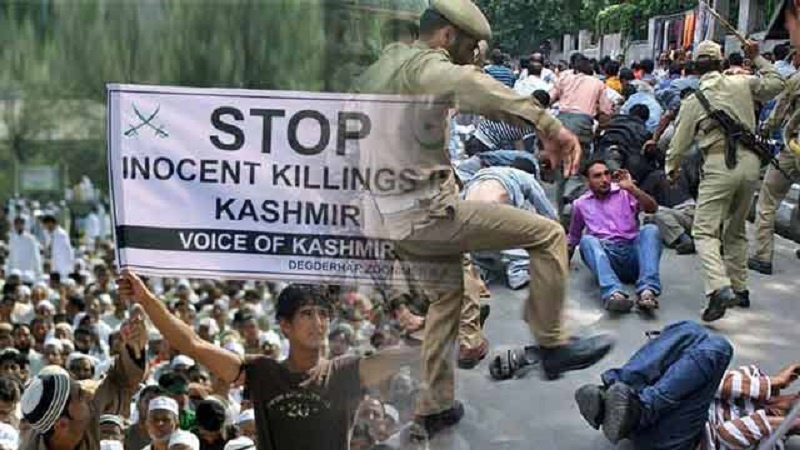Khurram Parvez targeted for work, says UN Human Rights Office, expressing alarm at rising killings of Kashmiri civilians
The UN voiced concern on Wednesday after the arrest of Kashmiri human rights defender Khurram Parvez in India, as well as recent killings in the Indian-administered region.
Parvez has now been in custody for more than a week and is accused of terrorism-related offenses under India’s Unlawful Activities Prevention Act (UAPA), said the UN Human Rights Office.
“We are unaware of the factual basis of the charges. He is known as a tireless advocate for families of the disappeared and has been targeted before for his human rights work,” spokesman Rupert Colville said in a statement.
“In 2016, he was detained under another controversial law, the Public Safety Act, for two and a half months after being prevented from traveling to the Human Rights Council in Geneva.”
Against this backdrop, the UN Human Rights Office said it was increasingly alarmed by the rise this year in the killings of civilians, including members of religious minorities, by armed groups in Indian-administered Kashmir.
“At the same time, civilians have been killed by security forces in the course of counter-terrorism operations, and their bodies on occasion disposed of in secret,” said Colville.
“One of these incidents happened on 15 November when four people were killed in a reported gunfight in Srinagar’s Hyderpora area, including two civilians,” he added.
Overly broad definition of terrorism
Colville noted that the UAPA empowers authorities to designate individuals and organizations as terrorists based on imprecise criteria and contains a vague and overly broad definition of a “terrorist act.”
“It allows people to be held in lengthy pre-trial detention and makes securing bail very difficult,” added the right office spokesman.
“The act is also increasingly being used to stifle the work of human rights defenders, journalists, and other critics in Jammu and Kashmir and other parts of India,” said Colville.
The UN rights office calls for the release of Parvez, he said, as well as for Indian authorities to “fully safeguard his right to freedom of expression, association, and personal liberty.”
He urged “prompt, thorough, transparent, independent, and effective investigations” into all killings of civilians and added that families should be allowed to mourn loved ones and seek justice.
Acknowledging the “need to prevent violence” in India, he said the Human Rights Office was concerned at “signs of a wider crackdown on civil society actors in Jammu and Kashmir.”
“The use of sweeping counter-terrorism measures risks leading to further human rights violations and deepening discontent,” said the spokesman.
Parvez’s arrest
Indian forces arrested prominent Kashmiri human rights defender Khurram Parvez on Monday under the country’s anti-terror law.
A family member told Anadolu Agency that officials from the National Investigation Agency (NIA), who raided his residence early Monday, took him to the agency’s nearby camp office.
They had conducted a previous raid on his home and office on Oct. 20, 2020, seizing computers and other gadgets in what the agency called a “terror-funding” case.
Parvez is the coordinator of the Jammu Kashmir Coalition of Civil Society (JKCCS), a highly respected rights organization in the disputed region.
He won the 2006 Reebok Human Rights Award for his work, which he carried out despite losing a leg in an IED blast in 2004 while monitoring an election in a remote northern Kashmir hamlet.
Disputed region
Kashmir, a Muslim-majority Himalayan region, is held by India and Pakistan in parts and claimed by both in full. A sliver of Kashmir is also held by China.
READ ALSO: Turkey will never submit its economic future to IMF – Erdogan
Since they were partitioned in 1947, India and Pakistan have fought three wars — in 1948, 1965, and 1971 — two regarding Kashmir.
Indian and Pakistani troops have also fought intermittently in the northern Siachen region since 1984. A cease-fire took effect in 2003.
Some Kashmiri groups in Jammu and Kashmir have been fighting Indian rule for independence or unification with neighboring Pakistan.
According to several human rights organizations, thousands have reportedly been killed in the conflict since 1989.



